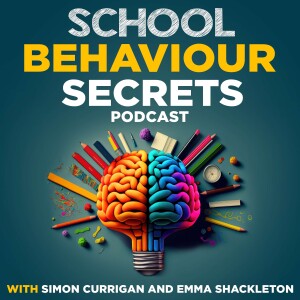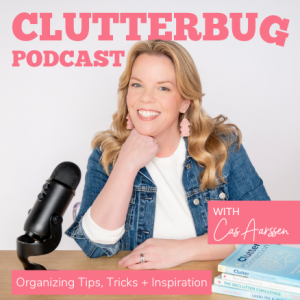

School Behaviour Secrets with Simon Currigan and Emma Shackleton
https://feeds.buzzsprout.com/1606363.rssEpisode List

Why De-escalation Isn’t Enough (And What To Do Instead)
Ever tried every de-escalation strategy in the book—calm voice, supportive stance, soothing words—only to watch a student keep spiralling? The problem isn’t you. The problem is that de-escalation on its own isn’t enough. In this episode of School Behaviour Secrets, we reveal why de-escalation so often fails in the heat of the moment, and introduce a new way of thinking about pupil behaviour: the PAINs framework (Primary Areas of Internal Need). Discover the five hidden stressors that keep kids dysregulated—physical, emotional, cognitive, social, and prosocial—and how to compensate for them so pupils don’t tip into crisis in the first place. If you’re tired of firefighting meltdowns and want practical strategies to prevent them instead, this episode is packed with insights you can use in your classroom tomorrow. Links: Download the SEND Behaviour Handbook for FREE Get more free resources about SEMH from Beacon School Support from this page

The Myth of 1:1 Support: Why 1:1 Support Isn’t Always the Answer for SEMH Success in Schools
Are one-to-one teaching assistants really the best way to support students with SEMH needs?In this episode of School Behaviour Secrets, we explore the myth of 1:1 support and its unintended consequences for schools and students.Discover why this topic resonates with teachers and SENCOs working to support pupils with a high level of need and how rethinking your approach could empower independence and resilience in a more sustainable way.Important links:CHECK OUT BEHAVIOUR 360 today if you want a joined up approach to SEMH in your school, with instant access to flexible, on-demand training: https://beaconschoolsupport.co.uk/behaviour_360.phpPop over to our YouTube channel where you can subscribe and keep up to date with any new releases.Get our FREE SEND Behaviour Handbook: https://beaconschoolsupport.co.uk/send-handbookDownload other FREE behaviour resources for use in school: https://beaconschoolsupport.co.uk/resources.php

Is Bullying A Form Of Trauma? Insights From Kidscape's New Research (With Paula Timms & Nathalie Noret)
Should bullying be viewed as trauma? In this episode of School Behaviour Secrets, we speak with guests Paula Timms and Nathalie Noret from Kidscape about groundbreaking research on the lasting impact caused by bullying.Discover how trauma-informed practices can transform how schools support students, reduce harm, and challenge misconceptions about bullying. Tune in for practical strategies every teacher, school leader, and parent needs to know.Important links:Explore Kidscape’s resources and research by visiting their website.Download our FREE behaviour resources for use in school: https://beaconschoolsupport.co.uk/resources.php

Relationships First: Rethinking Behaviour Policies in Schools (With Stephen Steinhaus)
Are you struggling with behaviour in your school or feeling a disconnect between staff and students? Then this episode is for you!Join us as we sit down with guest Stephen Steinhaus to unpack how relational behaviour policies, with a focus on relationships – not just rules - can raise standards, improve behaviour, and transform teaching in your school.Important links:Get our FREE Classroom Management Scoresheet HERE!Get our FREE SEND Behaviour Handbook: https://beaconschoolsupport.co.uk/send-handbookDownload other FREE behaviour resources for use in school: https://beaconschoolsupport.co.uk/resources.php

SEND At Breaking Point: Educational Psychologists Sound The Alarm On Support In Schools (With Dr. Gavin Morgan)
Educational psychologists play a vital role in supporting students’ special educational needs and mental health. Yet, a recent British Psychological Society report reveals that many EPs feel the SEND system is broken and unable to meet students' needs.Join this week’s School Behaviour Secrets as we join Dr. Gavin Morgan to discuss how funding cuts, high caseloads, and a shortage of educational psychologists are impacting our vulnerable students, and what needs to be done to ensure every child has a fair chance to succeed.Important links:To read the report by The British Psychological SocietyLearn more at: Twitter Facebook YouTube LinkedInGet our FREE SEND Behaviour Handbook: https://beaconschoolsupport.co.uk/send-handbookDownload other FREE behaviour resources for use in school: https://beaconschoolsupport.co.uk/resources.php
You may also like
Create Your Podcast In Minutes
- Full-featured podcast site
- Unlimited storage and bandwidth
- Comprehensive podcast stats
- Distribute to Apple Podcasts, Spotify, and more
- Make money with your podcast












